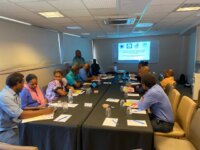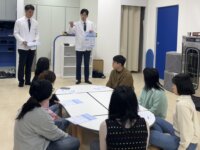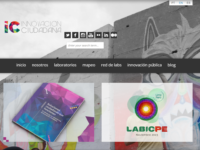Incheon City initiated a demonstration project utilizing AI technology to assist tourists and multicultural citizens in effectively communicating their symptoms to healthcare professionals. Mediark Inc. was chosen for this project through a public tender. The city supports the AI technology's development and demonstration costs, collaborating with Mediark Inc., the Incheon Medical Association, and the Pharmaceutical Association. Mediark Inc. introduced the SIMTOMI app in November 2023.
Innovation Tag: International Development
13 Fellows from 10 different African countries in 8 institutions of the African Union to build a culture of digital innovation: the AU Digital and Innovation Fellowship is the first supranational initiative to make administrative processes in the African Union more user-centred and effective. The challenge: 12 months to integrate innovation into the African Unions processes and products. The results: 11 products in diverse AU institutions and units. And that is just the start!
The Ministry of Environment, Water, and Agriculture in Saudi Arabia proudly introduces the innovative mobile application called Livestock Chain as a groundbreaking solution leveraging Blockchain technology to effectively manage livestock data within the all country regions. This visionary application is designed to preserve the rich heritage of livestock while offering a secure mechanism for data storage and retrieval, by assigning each livestock a unique identifier.
HighEd is a platform that enables young people who want to study abroad to make their plans for applying on the basis of safe and reliable information. Today, the number of young people from the Republic of Uzbekistan going to foreign countries to study is increasing. As young people go abroad, the number of consulting agencies that offer education orientation is increasing, but the services they offer can be inaccessible to many Uzbekistanis and some agencies operate illegitimately.…
Case Study
Trusted Official Statistics for Good Governance and Evidence Based Decision Making in Vanuatu

The Parliament of Vanuatu has struggled to fulfil its legislative, budget, oversight, and representation functions due to limited capacity to utilise trusted statistics. The Vanuatu Bureau of Statistics addressed this capacity gap through targeted training with Members of Parliament (MPs) and parliamentary civil servants to improve policy making. This is the first focused effort in Vanuatu to introduce data for sustainable development monitoring to MPs with the aim of enhancing good governance.
The Citizen Innovation Labs (Laboratorios de Innovación Ciudadana - LABIC) are a methodology to generate innovative solutions between citizens and institutions for the common good. They utilise a method to experiment, collaborate and accelerate innovative projects that emerge from citizens and have the potential to generate useful solutions to social, cultural, environmental and economic challenges. These solutions focus on the most pressing issues of the 2030 agenda and they are replicable,…
The techDetector is the first technology radar giving an overview of emerging technologies that have the potential to influence the area of sustainable development in the future. It lists future technologies from all sectors of sustainable development and assesses their potential impact on sustainability and gender equality. The techDetector helps inform, sensitize and support foresight processes, enabling better decision-making by providing sound information on technological developments.
IQed (Inquiries/Questions in education) utilizes cutting-edge Democratic Technology in classrooms for the purpose of empowering students and educators in Digital Literacy, Civic Literacy, Dynamic Engagement, Critical Thinking/Problem-Solving Skills and Global Competency Education. IQed enables every student to use their personal devices to explore, investigate and become informed on issues of governance and global matters, so that their voice can positively impact local and global communities.
KSPO has created the SOLF, Seoul Olympic Legacy Forum as a platform where Olympic legacy entities from all around the world gather for the first time to share and collaborate on sustainable development plans for the Olympic Legacy. Through the SOLF, Olympic legacy entities communicated and cooperated with each other to solve the long-term social problems after the Olympic games and to deliver intangible legacy of Olympic spirit and world peace to future generations.
Case Study
‘Con Vos’ Network: Digitalization for Effective Governance. Community Markets to Improve Access…

When applying for state aid or other services without the means or knowledge to do it online due to the digital gap, it usually takes a day or waiting in queues and filling out paperwork. Communities have thought and offered a grassroot solution: store owners helping their peers to get online procedures done in their business, in exchange for a small fee. It is a simple innovation, yet effective when it comes to decentralize public services, foster digital inclusion, and strengthen local markets





